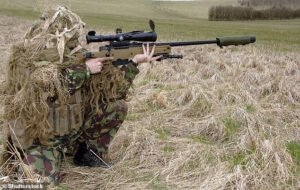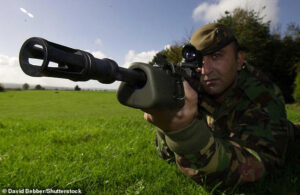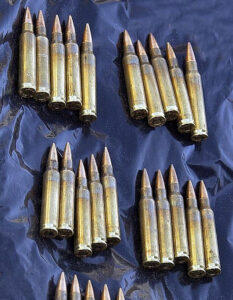News
British army is ‘laughing stock’ of NATO

The British army is said to be the ‘laughing stock’ of NATO because its outdated rifles wouldn’t be able to kill Russian or Chinese soldiers in advanced body armour.
The army still uses the L115A3 ‘sniper’ rifle, while other armed forces had updated to the same company’s AX models, which are lighter and enable soldiers to see further in the distance, according to a serving senior officer.
‘The Europeans used to love all of our kit but now laugh at it,’ the officer told the Times.
They said that snipers from a NATO ally in eastern Europe was ‘mind blown’ by the UK still using the old rifles.
About 500 snipers in the British army have a L115A3 rifle and they feel underfunded and neglected, according to the officer, who added that the UK had ‘fallen far behind the curve as far as capability goes’.
Units other than snipers face similar issues. The SA-80 standard infantry rifle, which has been used by British soldiers for four decades, has reportedly not changed much since the 1980s.
The SA-80 uses a 5.56mm round, which is the NATO standard, and the rifle was designed to pierce through old Russian helmets that are not in usage anymore, a second source said, adding that the rifle was ‘heavy and clunky’.
They also said the SA-80 – of which 150,000 are believed to be currently in service – was one of the ‘least updated’ rifles that wasn’t even made by others anymore.
Other allies like the US army were instead using a different ammunition calibre, a 6.8mm round – which is considered more lethal than the 5.56mm – in combination with XM7 and XM250 rifles by US firearms specialist Sig Sauer.

The army is reportedly using the L115A3 ‘sniper’ rifle (pictured), while other armed forces had updated to the same company’s AX models, which are lighter and enable soldiers to see further in the distance

The SA-80 standard infantry rifle (pictured), which has been used by British soldiers for four decades, has reportedly not changed much since the 1980s
Meanwhile, Russian body armour has improved and its latest kit for infantry soldiers includes ‘level 4’ armour designed to withstand fire from a Russian 7.62mm rifle
‘Your average [British] soldier wouldn’t be able to defeat it, not even close,’ the source told the Times.
The SA-80, which has been updated over the last four decades, including an update in 2020, is reportedly set to be replaced as part of Project Grayburn, which is currently still in the concept phase.
The 5.56mm round used in the SA-80 ‘can’t defeat Russian body armour, and it’s easily outranged by the latest Russian small arms,’ late US Major General Robert Scales told a Senate hearing in 2017.
In 2020, this was followed up by General Mark Milley, the US army’s chief of staff at the time.
He said that the 5.56mm was not able to penetrate ‘a type of body armour’, adding that ‘adversarial states’ were selling this online.
The Times’ source said that the US introducing the 6.8mm hybrid round could mean that NATO allies might struggle to share rounds on the battlefield in the future.
They said that even though this was known, the ammunition switch was made ‘for good reason’ as the 5.56mm was now ‘obsolete’ against modern body armour, according to the source.

The 5.56mm round (pictured) used in the SA-80 ‘can’t defeat Russian body armour, and it’s easily outranged by the latest Russian small arms,’ late US Major General Robert Scales told a Senate hearing in 2017

The Ministry of Defence was ‘behind the curve’ in terms of switching to better and more efficient rounds for battlefield rifles, according to Robert Clark, who works as a research fellow at the Yorktown Institute think tank in Washington DC (file image of the SA-80)
The Ministry of Defence was ‘behind the curve’ in terms of switching to better and more efficient rounds for battlefield rifles, according to Robert Clark, who works as a research fellow at the Yorktown Institute think tank in Washington DC.
Clark said the idea behind smaller ammunition had the advantage of being more likely to wound soldiers rather than kill them, which means that it would remove soldiers involved in casualty extraction.
But he added that in recent conflicts fighters like those from Russia have been ‘less concerned’ about saving the wounded, which would make smaller, less lethal rounds ‘less useful’.
The 5.56mm round was ‘almost useless’ against the Russians and Chinese, according to Clark.
The British army source told the Times that the issues UK soldiers were facing were ‘swept under the carpet’ while the MoD was portraying that the military was ready for war.
An MoD spokesperson said in a statement that the SA-80 had been upgraded ‘in recent years’, adding that it was ‘one of the most accurate service rifles’ currently in use all over the world.
The spokeswoman also said that the 5.56mm rounds were ‘tried and tested’ as well as the Nato standard, which ensured ‘interoperability among allied forces’.
News
Man in shock after lady he lodged with in a hotel in Abuja flees with his car and other valuables

A Nigerian man is currently in shock after a young lady identified as Precious Chinyere , whom he took to a hotel in the Asokoro area in the FCT for a romantic getaway allegedly fled with his car and other personal belongings on Thursday, February 5,
The distraught man and Precious had visited the hotel and opted for a short time stay. Things took a different in the evening when the man noticed Precious had left the hotel room without notifying him and took along with her some of his personal belongings including phones and laptop and also his car.
The victim immediately reported the incident to the police.
When contacted, the spokesperson of the FCT police command, SP Josephine Adeh, told LIB that the matter is currently being investigated and that efforts are being made to apprehend the suspect.
News
US Reacts As De@th Toll In Kwara Terror Attacks Hits 200

The United States Mission in Nigeria has condemned the k!lling of more than 200 civilians in recent attacks on communities in Kwara State.
Recall that terrorists launched de@dly attacks on Woro and Nuku communities in Kaiama Local Government Area of the state on Tuesday night, k!lling unsuspecting citizens.
It was gathered that the gunmen invaded the villages, opened fire on residents and burned homes.
According to reports, the de@th toll from the unfortunate incident hit 200 on Thursday night.
Reacting, the US Mission Nigeria condemned the k!lling via a post on its official X handle.
The post reads, “The United States condemns the horrific attack in Kwara state in Nigeria, which claimed the lives of more than 160 people, with the de@th toll still unconfirmed and many still unaccounted for.
“We express our deepest condolences to the families of those affected by this senseless violence.
“We welcome President Tinubu’s order to deploy security forces to protect villages in the area and his directive to federal and state officials to provide aid to the community and bring the perpetrators of this atrocity to justice.”
News
“I’ll never settle for a barber, yahoo boy or a poor man” — nail tech’s list of men she says she can’t marry sparks reactions online

A Nigerian nail technician has set social media talking after openly listing the kind of men she says she can never settle for.
In a now-viral post, she stated clearly that she refuses to “settle for less” and went on to mention professions and traits she considers a no-go area.
According to her, she can never settle for a barber, an aza man, a yahoo boy, a mechanic, an actor, a laundry man, a hype man, or a plumber. She also added that she wouldn’t marry a man with a high body count or a poor man.

-
Business1 year ago
US court acquits Air Peace boss, slams Mayfield $4000 fine
-

 Trending1 year ago
Trending1 year agoNYA demands release of ‘abducted’ Imo chairman, preaches good governance
-

 Politics1 year ago
Politics1 year agoMexico’s new president causes concern just weeks before the US elections
-

 Politics1 year ago
Politics1 year agoPutin invites 20 world leaders
-

 Politics1 year ago
Politics1 year agoRussia bans imports of agro-products from Kazakhstan after refusal to join BRICS
-
Entertainment1 year ago
Bobrisky falls ill in police custody, rushed to hospital
-
Entertainment1 year ago
Bobrisky transferred from Immigration to FCID, spends night behind bars
-
Education1 year ago
GOVERNOR FUBARA APPOINTS COUNCIL MEMBERS FOR KEN SARO-WIWA POLYTECHNIC BORI











